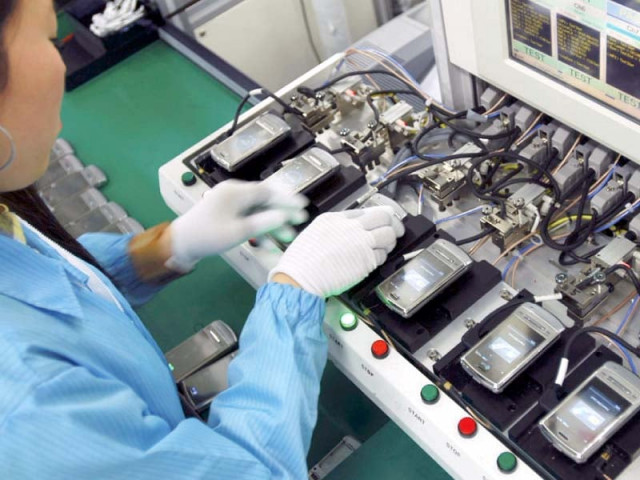Five companies plan to set up cellphone assembly lines
Haier, Foxcom and others seek telecom authority’s permission

Initially, the PTA will issue provisional no-objection certificates for six months to the applicants which will, in turn, inform the telecom sector regulator about the setting up of assembly plants for inspection. PHOTO: REUTERS
The development is set to attract foreign direct investment (FDI) worth millions of dollars and is expected to reduce the country’s growing import bill.
The companies that sought government’s permission to set up assembly lines include Haier, G5, Jio Phone, Mobo Mobiles and Foxcom.
Last month, the Pakistan Telecommunication Authority (PTA) issued guidelines for setting up assembly lines in Pakistan in a bid to step up the pace of digitalisation.
Apni Sawari: LTC launches mobile app for commuters
“We expect these companies to start manufacturing mobile phones in their plants soon,” a senior PTA official said.
“Mobile phone users in Pakistan are fast shifting to hi-tech products; of the 24 million mobile sets being imported in a year, almost half are smartphones,” he added.
Domestic manufacturing was expected to bring down phone prices and increase demand for smartphones, which would help achieve the goal of rapid digitalisation, he claimed.
China has been the hub of mobile phone manufacturing over the past one decade due to cheap labour. The resulting economic boom, however, has led to an increase in labour costs, which is also impacting cellphone prices in the international market.
“The government should frame a policy to provide incentives to the brands establishing assembly lines in Pakistan,” suggested a Samsung official in an email reply to a query.
PTA has insisted that all devices assembled in Pakistan should have clear marking stating “Assembled in Pakistan”.
Initially, the PTA will issue provisional no-objection certificates for six months to the applicants which will, in turn, inform the telecom sector regulator about the setting up of the assembly plants for inspection.
After six months, the applicants will have to demonstrate that the plants are functioning according to international standards.
“After evaluation and verification, the PTA will issue formal no-objection certificates following inspection of the assembly lines keeping in view the health, safety and technical standards,” the PTA official said, adding “we want to ensure international standards.”
Establishment of the assembly plants is expected to create a ripple effect and help boost broadband adoption since more people will be able to afford smartphones.
Smuggling is a menace in the mobile phone market at the moment, with even branded mobile companies being brought through illegal channels.
Recently, the Customs Intelligence Karachi seized 8,000 phones in a single raid, though the manufacturer has been provided the ‘Green Channel’ - a status given to reputable importers which entails less inspection and swift clearance.
According to market sources, mobiles worth about $1 billion are smuggled into Pakistan every year.
Crackdown Eight workshops sealed in Multan
“Increased taxation not only dents the buying power of customers, it also gives high margins on smuggling,” a mobile phone retailer said.
Even though the government has started curbing smuggling, the PTA is going to introduce a system through which handsets without a PTA-approved IMEI number will not work in Pakistan.
Cellphones without the PTA-approved seals are easily available at reduced prices as compared to phones with the PTA seal.
Owing to heavy smuggling, the imported mobile phone sets are cheaper in Pakistan in comparison to even tax-free countries and states such as Dubai.
Published in The Express Tribune, November 17th, 2017.
Like Business on Facebook, follow @TribuneBiz on Twitter to stay informed and join in the conversation.



















COMMENTS
Comments are moderated and generally will be posted if they are on-topic and not abusive.
For more information, please see our Comments FAQ